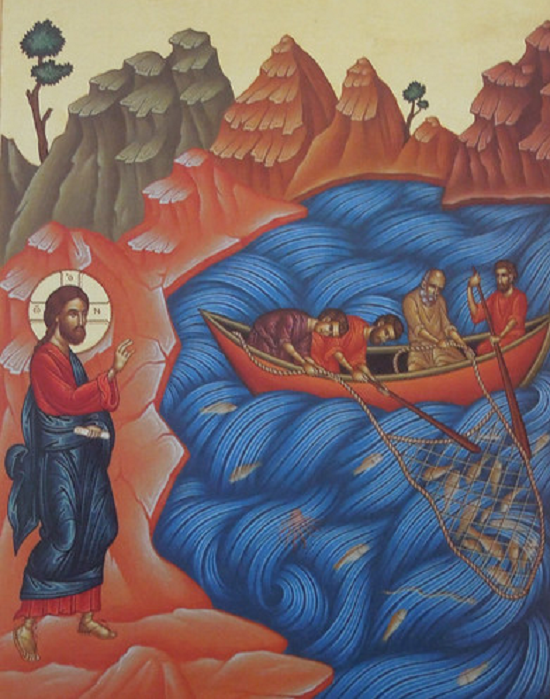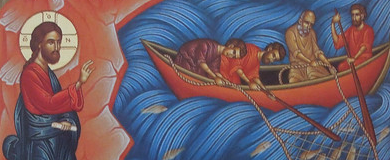What’s He Getting At?
Fifth Sunday Scripture Readings

Very early on, thanks to the preaching of the apostles, there were thousands of people following this new Way and calling themselves Christians because they professed Jesus of Nazareth as the Christ, the Son of God. Imagine yourself as one of them. What would motivate you to undertake writing down all that you had learned of Jesus: his life, his ministry, his death and resurrection, and all the events that followed after? Which details from all the various stories circulating at the time would you choose, and why? These remembrances were being told and retold, preached and proclaimed from Jerusalem to Rome and beyond. What would motivate you to undertake writing all this down—especially if you hadn’t been an eyewitness to the events yourself?
That pretty much describes Luke. What do we know of him? Paul describes him as a physician and, therefore a man of first-century science. He wasn’t a man who did things haphazardly or thoughtlessly. His use of language was sophisticated, showing a knowledge of the Greek classics. He was apparently born in Antioch of Syria, and it’s impossible to tell from what we know of him whether he was born in a Greek-speaking Jewish family, or if he came from a pagan family and converted either first to Judaism and then Christianity or directly to Christianity. In any event, it’s clear that he was writing to Hellenistic Jews and Greek converts to Christianity like himself. What was his purpose?
We find a big hint regarding the purpose of his writings in their structure. His narrative is in two volumes: the Gospel of Luke and the Acts of the Apostles. Volume one takes us step by step through the revelation of the Messiah to the people of Israel up until the coming of the Holy Spirit. Volume two picks up where the first volume ends and takes us through the revelation and working of the Holy Spirit in the birth and development of the Church, the Body of Christ. By telling the story of Jesus, Luke is laying the groundwork and foundation for his exposé on the Church. We can almost hear the new converts to Christianity asking, “You people claim to be a Church that embodies the very Holy Spirit of God who raised Jesus from the dead. How did this all come about?” Then, as now, there were many, sometimes conflicting explanations. So, we see that, as Luke tries to answer their questions in his writings, he always has one eye on his audience, the herd of cats called the Church.
We can see how this plays out in today’s gospel reading, the call of the first disciples. Luke is well acquainted with the earliest gospel, that of Mark. Mark describes this same event using only seven sentences [Mark 1:16-20]: Jesus meets Peter and his brother Andrew drying nets by the sea, and he calls them. Then Jesus meets James and John and he calls them, too. They follow him. He says in the future they’ll be catching men. The end. That’s it. Because Luke modified the story and expanded on it, we should expect that he wanted to provide his readers with more than a simple description of an event from Jesus’s life.
In Luke, Jesus isn’t alone, but he’s followed by a crowd, teaching them. The fishermen had to be very aware that they were in the presence of a notable rabbi. Jesus gets into Simon’s boat and teaches the crowd from there. Simon’s brother, Andrew, is strangely missing, so the spotlight is on Peter and his boat alone. When Jesus asks Peter to go back out fishing, Peter reluctantly agrees, calling him “Master,” the term used in Greek for a rabbi. Peter’s obedience to Jesus’s request to go back out fishing has overtones of the obedience of the Jewish people to the Law of Moses, even though, for both of them, their actions didn’t always necessarily make sense.
In this case, following the instructions of Jesus yields a huge reward: an amazing catch of fish. Peter isn’t capable of handling it on his own and must rely on his fellow apostles, James and John, in order to handle the enormous quantity successfully. Simon’s response to the miraculous results of his efforts is, “Depart from me, Lord, for I am a sinful man.” This time, he addresses Jesus with the term, “Lord”—in Greek, κυριος (kyrios)—the word used in the Greek Bible for Yahweh. In reply, Jesus says to him, “from this moment on, you will be catching men.” Here, Luke uses the singular “you,” meaning Peter himself, whereas Mark used the plural, meaning the apostles in general.
All of these changes to Mark’s text are deliberate. What Luke has done here is to take a simple event—the call of Peter, Andrew, James, and John as Jesus’s first disciples—and transform it into a model of the Christian Church of his day. Here, Simon alone is the catalyst for the remarkable success of the early Church, symbolized by the catch of fish, ably assisted by his partners, the other super-apostles, James and John. In the way Luke describes this event, he shows us, his readers, that it’s Simon Peter, the rock, who is the touchstone of the authentic Church.
At this time in the early Church, there was no universally agreed-upon understanding of who Jesus was and the meaning of what happened in Jerusalem and beyond. The confusion amid this cacophony of voices must have been enormous. What Luke seems to be saying here is, “By their fruits you shall know them.” Where do you find the miraculous catch of new converts? You will see that success not only in numbers but also in spiritual growth happens through association with Peter and the Church built on the foundation of his faith and that of the other apostles.
Now, does that mean that only those who pledge their allegiance to the Pope and obey every rule and regulation set down by the “institutional Church” can find salvation? Not at all. If anything, the message of Jesus is that you cannot obey your way to salvation. That was the bane of the followers of the Law of Moses. Nor can you believe your way to salvation like those who fight wars over differences in doctrinal statements. Success as a follower of Jesus comes from keeping our eyes on Peter and doing what Peter did. We can trust, as Peter did, that if we listen to Jesus, there will be fish. We can trust, as Jesus did, that if we surrender to the will of the Father, he will raise us up. We can trust, as the apostles did, that the way to salvation lies in leaving our own futile solutions behind, following the Lord, the κυριος (kyrios), and, by our example, becoming fishers of women and men.
Get articles from H. Les Brown delivered to your email inbox
